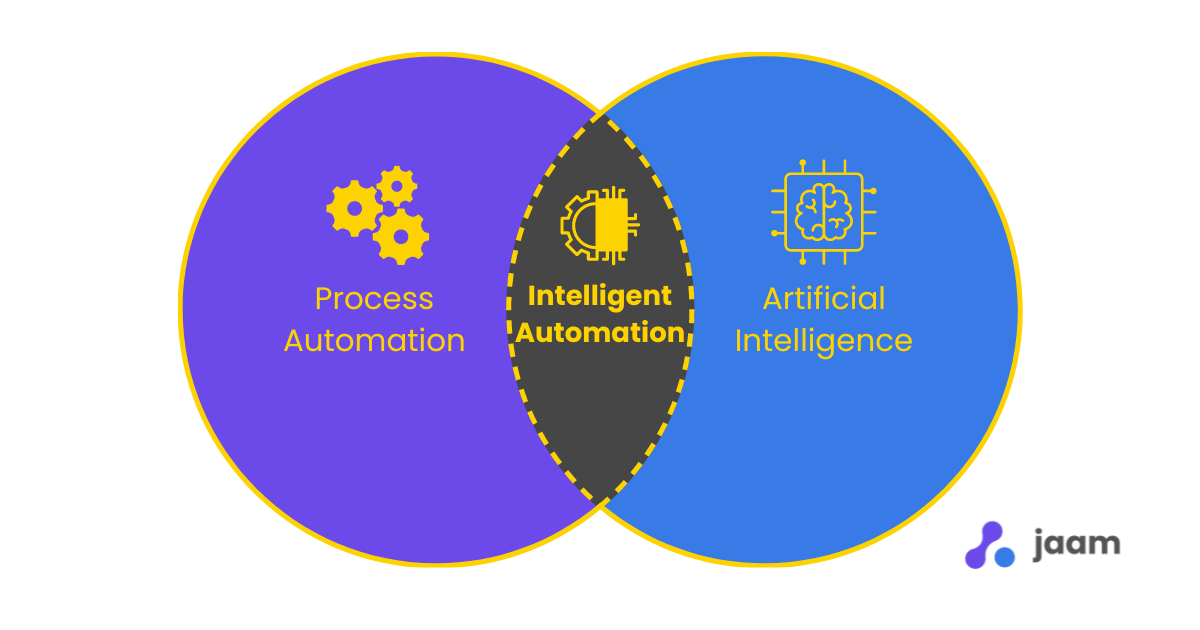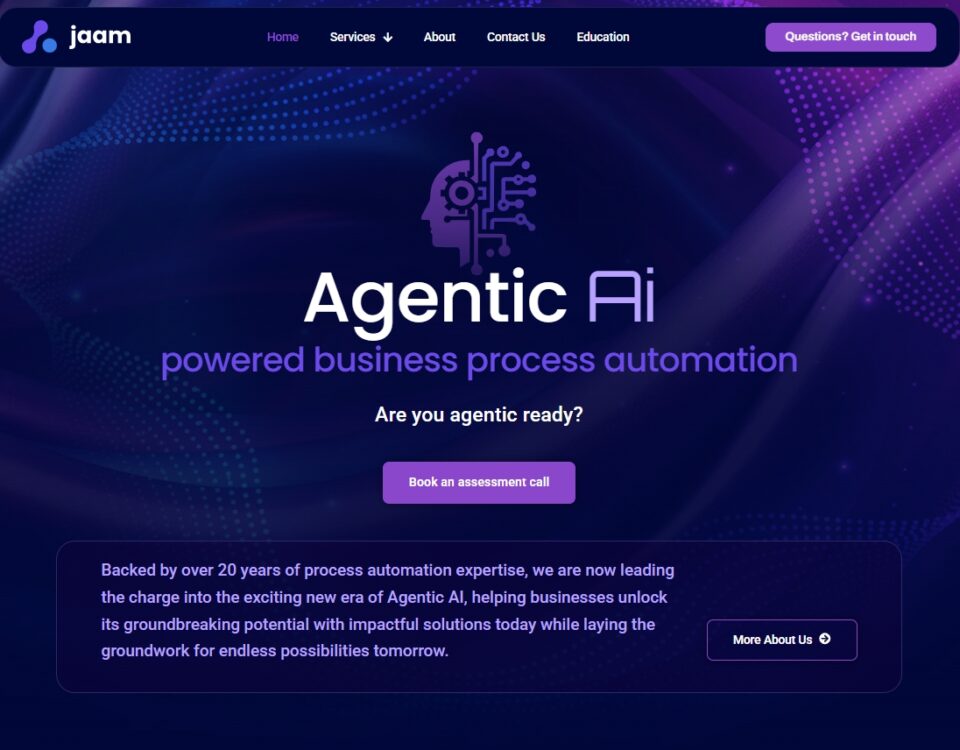The technology landscape has become saturated with solutions that are ‘intelligent’ and ‘automated’, leaving businesses to wade through a sea of options. If you’re wondering what intelligent automation really means and whether it holds any value for your business, we’ve distilled key insights in this brief guide.
Put simply, intelligent automation combines AI with various process automation technologies like Robotic Process Automation (RPA), Business Process Management (BPM), document generation, and low-code workflow automation. By integrating the unique strengths of these different technologies, organisations are significantly broadening the scope of tasks they can automate, leading to remarkable gains in efficiency and productivity.
Consider, for instance, the onboarding process for new customers or employees. Traditionally, this has involved numerous time-consuming tasks like completing paperwork and managing a barrage of emails. With intelligent automation, this process is revolutionised. Implementing digital forms and automating repetitive data tasks and workflows can drastically reduce manual effort.
However, it’s the addition of AI capabilities like natural language processing and machine learning that takes this digitally-enabled process to another level. AI can, for example, be used to read, understand and process unstructured data. It could even be used to personalise the experience for each individual. This accelerates the onboarding process and significantly reduces the workload for your HR team. It also minimises errors and ensures a transparent digital audit trail for compliance.
Embracing intelligent automation: trends and impact
The potential applications of intelligent automation are vast and varied, across multiple industries and areas of the business. Whether you’re a startup or an established enterprise, understanding and harnessing the power of intelligent automation is crucial for maintaining an edge in today’s tech-enabled world.
This shift is well illustrated by Deloitte’s recent Global Intelligent Automation survey, which shows that 74% of organisations are already using Robotic Process Automation (RPA), and 50% are implementing Optical Character Recognition (OCR). There’s a growing interest in newer technologies, with 46% planning to implement AI over the next three years. The rise of low-code technologies is also noteworthy, growing from 24% in 2020 to 40% by 2022, indicating a trend towards more user-friendly automation options.
Why more businesses are choosing intelligent automation
Here are five key reasons why businesses are increasingly incorporating intelligent automation into their operations:
- Efficiency and productivity:
Businesses turn to intelligent automation to transform slow, manual tasks into swift, streamlined digital processes. This shift enhances performance through standardisation, consistency and improved data accessibility, ensuring a faster and more efficient workflow for companies.
- Time management:
Intelligent automation enables businesses to free up their skilled and talented workforce to focus on more critical tasks. This empowers employees to contribute more meaningfully to their roles, enhancing their job satisfaction and the overall value they bring to the organisation.
- Cost control:
By expediting tasks and reducing human error, intelligent automation helps businesses identify and eliminate cost inefficiencies. This leads to the removal of bottlenecks and a significant boost in profitability.
- Best practices and compliance:
Companies adopt automation to build standardised, digital and optimised processes that consistently perform correctly. Enhanced transparency and comprehensive audit trails bolster oversight and regulatory compliance, a vital aspect for any business.
- Agility and scalability:
Intelligent automation allows businesses to keep their processes agile and adaptable to new demands or challenges. Secure access to data, documents and work tools from anywhere supports a hybrid working model, which is crucial for attracting and retaining top talent globally. This prepares businesses for the evolving landscape of work.
Key tools and technologies
Adopting intelligent automation is less daunting than it may seem. The market offers a range of user-friendly automation technologies that easily integrate with everyday business systems. These tools are also highly adaptable, allowing you to tailor them to your specific requirements. This ensures that you can start small and scale up as your comfort and familiarity with these technologies grow, making the transition to intelligent automation a smooth and manageable process.
Whether it’s choosing a single technology or a blend of several complementary tools, you can create a customised approach that maximises efficiency and effectiveness for your business operations. To guide your decision, here’s a quick overview of the options available:
- Process Mapping:
This technology allows you to effortlessly document and map out your business processes. It provides a clear, digital visualisation that’s easily accessible to your entire team. With these tools, you can identify potential areas for optimisation, ensuring that every process is as efficient as possible.
- Workflow Automation:
Transform your business processes into digital workflows, integrating data and orchestrating tasks between people, robots and systems seamlessly. This technology streamlines operations, connecting various elements of your business for smoother, more efficient operations.
- Robotic Process Automation (RPA):
RPA technology enables you to create software robots that automate time-consuming and repetitive tasks, using the same process steps and systems your team relies on daily. This not only speeds up work, but also frees up your staff to engage in more interesting and fulfilling projects, enhancing overall job satisfaction and productivity.
- Document Automation:
Automate the creation and collaboration of essential documents like contracts and invoices. This technology allows you to generate and manage documents with just a few clicks from anywhere, ensuring accuracy, efficiency and compliance with relevant regulations.
- Artificial Intelligence (AI):
Today, it’s possible to incorporate advanced AI capabilities such as machine learning or natural language processing into your automation solutions effortlessly. Practical AI can, for instance, interpret unstructured data (like emails) or develop chatbots that provide customers and employees with easy, conversational access to real-time information, advice and services.
Each of these technologies offers unique advantages, paving the way for a more automated, efficient and future-ready operation.
Intelligent automation in action
Here are three interesting case studies that highlight the diverse uses and the real-world benefits of intelligent automation:
- Real estate: A Canadian company in the real estate registry services sector implemented an SS&C Blue Prism intelligent automation solution with OCR capabilities to automate the processing and verification of complex, often handwritten documents. This shift from a manual process, which previously took up to four days to complete with a 30% error rate, has significantly improved efficiency. Now, transactions are completed in just one day, a 75% reduction in turnaround time, and the company processes 30% more volume.
- Medtech: A global manufacturer of continuous glucose monitoring devices adopted an AI-powered RPA solution from UiPath to enhance efficiency and curtail manual work in their manufacturing operations. They have succeeded in driving overall process improvements, freeing up 200,000 hours through automation and bringing cycle time down drastically, by 80%.
- Music: An international leader in musical instruments and audio equipment significantly streamlined its contract creation process using a Nintex document generation solution. Previously, handling legal agreements across various divisions was a laborious task, taking weeks and involving extensive manual work. The new tool transformed their contract generation and management process, automating and speeding up the entire procedure to save an average of four weeks per master distribution agreement, drastically shortening the time from quote to cash.
Where to next?
With so many options available, choosing the right intelligent automation approach for your business – or deciding which processes to transform – can seem overwhelming. This is where our expertise comes into play. At jaam automation, we know how to help you take full advantage of the opportunities available to you, informed by a clear understanding of how your teams operate.
We work with you to develop an intelligent automation strategy that not only enhances your team’s effectiveness, but also leverages your existing data and system infrastructure for greater value. For more information or to discuss your specific ambitions, please get in touch.






